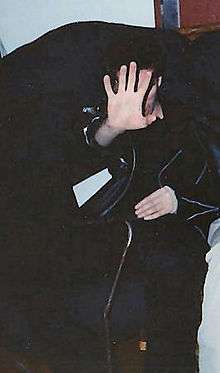James Parry


James Parry (born July 13, 1967), commonly known by his nickname and username Kibo /ˈkaɪboʊ/, is a Usenetter[1] known for his sense of humor, various surrealist net pranks, an absurdly long .signature,[2] and a machine-assisted knack for "kibozing": joining any thread in which "kibo" was mentioned.[3] His exploits have earned him a multitude of enthusiasts, who celebrate him as the head deity of the parody religion kibology, centered on the humor newsgroup alt.religion.kibology.
Background
James Parry grew up and lived in Scotia, New York. He showed early computing skills, such as being able to open up and reprogram ROM video game cartridges such as those for the Atari 2600, but was more interested in graphics and artistic pursuits. In this vein, he was initially a computer engineering major at Rensselaer Polytechnic Institute (RPI) in Troy, New York, but moved to Boston, Massachusetts in 1990 and attended Emerson College, where he studied videography and graphic design. At that time, he also worked as a typeface designer and for the world.std.com internet service provider. He developed several fonts in use today. One of his better known works is the typography for Philip K. Dick's novel "Gather Yourselves Together."[4]
Growing fame
In the early 1990s, as public awareness grew of the Internet and Usenet, Parry received publicity, including a cover story in Wired magazine mentions in Playboy and Time magazine, and appearances in such publications as The Times.[4]
He became known on Usenet for grepping all occurrences of the term "Kibo"—whether intended to refer to Kibo himself or not—and replying, often in a fanciful manner. A typical exchange:[5]
Mary Rose Campbell wrote:
>At CMU, we also have something called Gray Matter in the center of Skibo
>(our student union substitute). It's a bunch of shapes, walls, holes,
>and steps covered with the same dark gray carpet that's on the floor.
>It looks like a giant cat toy.
Actually, it's a life-size model of S. Kibo himself, my great great
grand-uncle. This was before he evolved past the 'giant metazoic
amoeba' stage a few aeons ago. Now he's a trilobite.
– K.
This practice became known as kibozing. In 2006, Parry estimated that he had posted "an average of 20 articles a week to alt.religion.kibology during the past 15 years, probably about 500 words of original content per article, that's... seven point eight mmmmillion words. Equivalent to about 100 books."
He is perhaps best known on Usenet for his famous (or infamous) "Happynet Proclamation" (1992), circulated to many newsgroups, some absurdly unrelated, which satirised the endless flamewars on the network, with Parry posing as a godlike being issuing an edict full of in-jokes and humor targets that claimed to unify all news into one glorious totality, "happynet". In the article, Kibo claimed that:[6]
********* HAPPYNET: THE NET THAT'S HAPPIER THAN YOU! ********* UNDER THE AUSPICES OF THE ALL-WISE LEADER KIBO, THE NEW NETWORK SHALL BE ORGANIZED THUSLY: Three hierarchies encompassing ALL HUMAN DISCOURSE. => nonbozo.* => bozo.* => megabozo.* Existing groups will be moved into the new organization scheme, resulting in nonbozo.news.announce.newusers, bozo.rec.pets, megabozo.talk.bizarre, nonbozo.comp.virus, bozo.alt.sex, megabozo.alt.fan.lemurs, bozo.postmodern, etc., as determined by scientific measurements of the bozosity of the groups, measured by Leader Kibo's Council On Scientific Bozosity and the faculty of Rensselaer Polytechnic Institute (Troy, NY), world leaders in bozosity assessment. It is estimated that the breakdown will be thus: 1.0000% nonbozo.* 90.0000% bozo.* 9.0000% megabozo.* (Computations courtesy of Bell Labs) Bozo.* will, of course, be subdivided logically: bozo.nerd.*, bozo.tv.*, bozo.inane.*, bozo.boring.*, bozo.sex.*, bozo.argue.*.
The term "bozo" and related jokes like the physics particle the "bozon" were Parry hallmarks. Revisions of the Manifesto were published in 1994 and 1998, and HappyWeb was introduced in 1999.
Parry has a variable dedicated to him in the Geek Code, describing how far a particular person is familiar with Kibo.
In 1992, at age 25 (ten years younger than the constitutional minimum age for election), he launched a spoof campaign for President of the United States.[7]
After constant daily changes for over a decade his personal website stayed stagnant from late March 2004 until late December 2005, and has not been updated in recent years.
Publications
- James K. Parry (1994). USENET According to Kibo. Alpha Books. ISBN 0672306220.
References
- ↑ Baczewski, Philip (1994). Philip Baczewski, ed. Tricks of the Internet Gurus (1 ed.). Indianapolis: Sams Publishing. ISBN 0-672-30599-2. LCCN 94067090.
James "Kibo" Parry is a highly prominent Usenet user; one Usenet group named for him, alt.religion.kibology, has at least 88,000 subscribers.
- ↑ "Kibo's .signature". Archived from the original on 2007-01-04. Retrieved 2008-09-25. Version saved by googlepages dated "5/5/94"
- ↑ Fisher, Danyel (2003). From Usenet to CoWebs: interacting with social information spaces. Springer. p. 258.
- 1 2 James Parry (1998-02-24). "Kibo's Media Scrapbook". kibo.com. Retrieved 2011-03-27.
- ↑ Message-Id: BKo6Cr.DFp@world.std.com Fri, 6 March 1992 02:17:15 GMT, Google Groups archive of usenet message
- ↑ Message-ID: C4sFz1.Fw2@world.std.com Thu, 1 April 1993 04:47:24 GMT, Google Groups archive of usenet message
- ↑ Bruckman, Amy (September 1993). "1.04: Electric Word – Kibo is God". Wired. Retrieved January 16, 2013.
Further reading
- Wired magazine profile, September 1993.
External links
- Kibo's website
- The alt.religion.kibology newsgroup (via Google Groups)
- http://www.birdhouse.org/etc/kibosig.txt – .signature